Board of Directors
CPKN is governed by a volunteer Board of Directors of senior level policing professionals from police services and training institutions. The Board establishes the organization’s strategic priorities based on the needs of the public safety community.
Born and raised in Nova Scotia, Chief MacSween moved to Ontario in 1987 and began his career with York Regional Police in 1989. He brings a balance of operational, administrative and strategic experience to his current role.
Chief MacSween is responsible for 2,300 employees, an operating and capital budget of $390 million and community safety for 1.2 million citizens.
He has previously served in the #2 District Criminal Investigations Bureau, the Hold-Up Unit and the Community Services Bureau. Deputy Chief MacSween was promoted to the rank of Inspector in 2013 and was assigned to the Duty Inspector Bureau in the Town of Aurora. He also served as an Inspector in the Training and Education Bureau. In 2016, he was promoted to the rank of Superintendent and served as the officer in charge of #2 and #4 District respectively. He served as Superintendent of Operational Command, which includes the 9-1-1 Communications Centre and the Real Time Operations Centre. He was promoted to Deputy Chief on May 15, 2019 and assigned to the Support Branch before assuming the role of Chief on May 1, 2020.
Chief MacSween holds a Bachelor of Applied Arts Degree in Justice Studies from the University of Guelph and a diploma in Police Foundations Leadership from the Humber College Institute of Technology and Advanced Learning. His professional leadership training includes the Police Leadership Program at the Rotman School of Management and the Executive Strategic Management program at the Senior Management Institute for Police in Boston, Massachusetts.
He is a recipient of the Governor General’s Exemplary Service 20-year medal and completed his 30th year of policing in October of 2019.
He currently sits as an Executive Committee Vice President of the Ontario Association of Chiefs of Police and on the Board of Directors of the Canadian Police Knowledge Network (CPKN). He is also an active member of the Canadian Association of Chiefs of Police, the Police Executive Research Forum, the International Association of Chiefs of Police and the Major City Chiefs Association.
Active in the community, Chief MacSween is currently the Chair of the Board of Directors for St. John Ambulance and has previously served as Chair of its Community Services Committee. He has volunteered his time with such organizations as Habitat for Humanity and Special Olympics Ontario, including serving on the games organizing committee for the 2013 Special Olympics Summer Games held in York Region. He is also an annual participant in the Law Enforcement Torch Run.
Chief MacSween has extensive experience in the areas of leadership development, performance management, project management, innovation and technology and change management.
He remains proud of the partnerships York Regional Police share with both policing and non-police agencies and the strong relationships that have been developed with the diverse communities in York Region.
Chief MacSween is married with four children and enjoys spending quality time with his family.
Assistant Commissioner Jennifer Ebert assumed her role as the Commanding Officer of RCMP Newfoundland and Labrador on April 25, 2022.
She was born and raised in London, Ontario and joined the Royal Canadian Mounted Police in 1997. She has served in various locations and capacities in her 25-year policing career, with postings in the Northwest Territories, Nunavut, Alberta, Saskatchewan and, most recently, Prince Edward Island as Commanding Officer of the RCMP there.
In Alberta, she was posted to Hinton Detachment in General Duties and then to Edson Provincial General Investigation Section. She was promoted to the Major Crime Unit in Edmonton in 1998 and promoted to Wood Buffalo Detachment in 2011 as a Team Leader of Serious Crimes and Domestic Violence Units. While at Wood Buffalo, she was designated as an Accredited Team Commander. During her final two years at Wood Buffalo, she managed the Professional Standards and Administrative office and received the Queen's Jubilee Medal.
In 2014, Assistant Commissioner Ebert became the Officer in Charge of the Major Crimes Branch in Saskatchewan; during 2016 she also served as the Acting South District Commander.
She has an extensive background in Major Crimes including homicides, crimes against persons and sensitive investigations and was promoted to Superintendent in January 2017 in the role of Officer in Charge of Major Crimes Branch in Saskatchewan.
In the summer of 2017, Assistant Commissioner Ebert was promoted to the rank of Chief Superintendent and was appointed as the Commanding Officer of RCMP Prince Edward Island.
A political science major in University, Assistant Commissioner Ebert holds an Honours Bachelor of Arts degree from Lakehead University, a Police Leadership Certificate from Dalhousie University, a Professional Leadership Certificate from the University of Regina and a certificate in NeuroLeadership from the NeuroLeadership Institute NY, as well as other professional police leadership certificates from the Australian Institute of Police Management and Charles Stuart University.
She lives with her husband and youngest child in the community of Portugal Cove-St. Philip’s and looks forward to enjoying the coastlines, trails and culture of Newfoundland and Labrador.
Chief Nishan Duraiappah was born in Sri Lanka, and immigrated to Canada. He began his career with the Halton Police in December 1995. He served as a Constable for several years in uniform patrol in the towns and cities of Milton, Halton Hills and Burlington and in their general investigative divisions.
Throughout his career he has worked in the Regional Drug & Morality Bureau, Guns & Gangs Unit, District Criminal Investigations and with the RCMP Combined Forces Special Enforcement Unit. He also maintained a strong commitment with many of the Region’s diverse, cultural and faith communities as the Halton Police Diversity & Cultural Relations Coordinator.
Chief Duraiappah has served as the Operations Commander for Milton and Halton Hills, the Commander of the Office of Continuous Improvement and Strategic Management (OCISM) and Chief’s Executive Officer. He was promoted to Deputy Chief in the fall of 2015, charged with leading District Operations for all four municipalities, and the Regional Community Mobilization Bureau, Information Technology and Strategic Management Office.
In October of 2019, Chief Duraiappah was appointed Chief of Peel Regional Police.
Chief Duraiappah holds a Bachelor of Arts Degree in Sociology and Criminology from the University of Toronto, and a Diploma of Public Administration from the University of Western Ontario. Chief Duraiappah serves on the OACP Board of Directors and has served on various OACP Committees throughout his career. He is the recipient of the Queen Elizabeth II Diamond Jubilee Medal (2012), and is a Member of the Order of Merit Canada (2016).
Chief Duraiappah has maintained a strong commitment to his community and is involved with several sports and hobbies as well as a volunteer board member for the United Way, and the South Asian Autism Awareness Centre in the GTA.
Mr. Fady Dagher has over 30 years’ experience in various roles in the police force. He held several positions before being appointed manager, where his keen interest in innovation led him to introduce cutting-edge policing practices and innovative projects to improve the service provided to the public and raise awareness of police duties.
Recognized for his unifying leadership, he was Chief of the Service de police de l'agglomération de Longueuil from 2017 to 2022, before returning to the fold and becoming Chief of the Service de police de la Ville de Montréal (SPVM), where he had previously worked for 25 years.
Born in the Ivory Coast to parents of Lebanese origin, Mr. Dagher is the first diversity Chief of the SPVM.
During his long career at the SPVM, he climbed the career ladder, holding in turn the positions as police officer, supervising sergeant, investigating officer, commander (chief of a neighborhood police station), inspector, chief inspector and assistant director. He has been responsible for wide-ranging issues such as mental health, prevention of racial and social profiling, prevention of radicalization leading to violence and the portable camera pilot project. He has also managed complex issues in relation to illegal occupancy of public property, where his mediation skills were put to good use.
Mr. Dagher is an excellent communicator and proud Montréal resident, who has stood out throughout his career due to his ability to forge ties with diverse communities and his keen interest in innovation. He is a polyglot and speaks French, English and Arabic.
He is a seasoned manager and holds an Executive Master's degree in business administration (EMBA) from McGill University and HEC Montréal. Several prizes have also been awarded to him in recent years. He was recently selected for the award for the 15 real influencers in Québec announced by La Presse.
He prefers a vision of policing based on openness and humility towards the public. The objective for Montréal is to have an inclusive police force which, in complete synergy, understands the challenges facing the public, which strengthens residents’ feeling of safety, which works together with partners and which focuses on both preventing and suppressing crime.
Paul was born and raised in the Ottawa area. He joined the RCMP in 1982, and after graduating he was assigned to the RCMP “O” Division (Ontario), Chatham Drug Section. He was transferred to the Kitchener Drug Section in March 1989.
In January of 1991, he was transferred to Regina, and promoted to the rank of Corporal at the RCMP Training Academy (Depot). During his tenure at the Training Academy Paul was promoted to Sergeant as a Team Leader responsible for the supervision of instructors, delivery of the training curriculum and monitoring Cadet performance.
In July 2000, Paul was transferred to the RCMP National Headquarters in Ottawa where he gained experience at the corporate level of the organization. In 2003, he received his Commission as the Executive Officer to the Deputy Commissioner, Central Region. In 2005, Paul was seconded to the Ottawa Police for a period of 15 months as the Officer in Charge (OIC) of Patrol Operations, East Division.
In 2006, he was transferred to Ontario Division HQ in London and promoted to the rank of Superintendent. For the next two years, Paul was the Division Intelligence Officer, and was responsible for the Intelligence Program for the RCMP in Ontario. In August 2008, he assumed the role of OIC “O” Division Federal Operations Support Branch where he provided specialized support to National Security files and, Serious and Organized Crime projects.
In December 2014, Paul was asked to return to the RCMP Training Academy, Depot Division as the OIC Support Services. As a Senior Leader at the Training Academy, Paul was responsible for 14 programs and services that supported Depot Division and training.
Paul retired in the fall of 2016 with almost 35 years with the RCMP. He joined the Ontario Police College (OPC) in September 2016, which is part of the Public Safety Division of the Ministry of the Solicitor General. His initial position was as the Deputy Director Operations before being appointed as the Director of the College in October 2017.
In spring of 2018 Paul joined the CPKN National Advisory Committee and in the fall of 2019, he became the co-Chair of the Collaboration and Engagement sub-committee.
In September 2021, Paul took over as Chair of the National Advisory Committee and a member of the Board of Directors.
Paul is committed to life-long learning and is passionate about training. He is looking forward to working closely with CPKN, the Board of Directors and the National Advisory Committee.
Rob O’Reilly is the Chief Learning Officer (CLO) for the Royal Canadian Mounted Police (RCMP). In this role his principle responsibilities include providing corporate leadership in articulating the vision for modernized learning and professional development opportunities across the RCMP. The CLO is also expected to provide executive oversight for the development of national policy and strategic direction governing the learning mandate of the organization.
Rob joined the RCMP in 1996, and spent the early years of his career developing new media tools for Contract & Indigenous Policing and Learning & Development. In 1998, as the Manager of Technology Assisted Learning he created the first online learning portal for Canadian law enforcement, for which the RCMP won the APEX Award for Leadership in Service Innovation. In 2001, as the RCMP’s e-HR Senior Advisor, Rob drove the migration of the organization’s HR services online.
In 2002 Rob moved to the Critical Incident Program, creating immersive learning for National Incident Commanders and Crisis Negotiators. In 2005, he transferred to the RCMP’s National Division as Officer-in-Charge of Operational Readiness & Response, overseeing emergency operational and contingency planning for the National Capital Region.
In 2009 Rob became Executive Officer & Strategic Advisor to the Deputy Commissioner for Specialized Policing Services (SPS). Still within SPS, in 2012 he was promoted to the Director of Firearms Regulatory Services for the Canadian Firearms Program, providing executive leadership of the national firearms licensing & registration regime.
Rob’s last role was as Chief of Staff to the RCMP Commissioner, providing strategic advice to her, and ensuring a strong and productive working relationship between the RCMP, the Office of the Minister of Public Safety, and other Public Safely Portfolio Agencies. Rob assumed his current role as Chief Learning Officer in 2021.
Prior to joining the RCMP, Rob spent several years with the Canadian Broadcasting Corporation, finishing out his time there as Communications Officer for English Language Television.
Born in Saskatchewan, Rob completed a Specialized Degree in Broadcast Communications at Concordia University in Montreal. He was also awarded the Queen’s Diamond Jubilee Medal in 2012. He currently lives in Ottawa, and has two teenage children.
Colin Stairs was appointed as the first Chief Information Officer (CIO) of the Toronto Police Service on March 24, 2020. In his role as CIO, Colin oversees the Information Management and Information Technology Services pillars and is responsible for furthering the organization’s goal of transforming operational capacity, efficiency and agility through the information and technology portfolios.
Prior to joining the Service, Colin led digital transformations as the CIO in private, public and mental health sectors, creating new capabilities and accelerating innovation throughout the organizations. Colin was also a founding member of start-ups in software development and management consultancy.
Colin holds a Bachelor of Mechanical Engineering from Queen’s University and a Master of Business Administration from the University of Western Ontario. He has been a guest lecturer in Health Policy, Management and Evaluation at the University of Toronto, and currently sits on the Board of Directors of Portage, a residential drug rehabilitation program for youth.
Deputy Chief Roger Wilkie began his career with the Halton Regional Police Service in 1996. Throughout his career he has served in uniform patrol, Drug Unit, Mobile Surveillance Unit, Homicide Unit, Criminal Investigations Bureau, Domestic Violence Unit and as the Executive Officer to the Deputy Chief.
As a Senior Officer he was the Operations Commander in Milton and Halton Hills, District Commander in Oakville, Critical Incident Commander for major public safety incidents and the Commander of Emergency Services, Training, and Human Resource Services.
He was promoted to Deputy Chief of Regional Operations in 2018, and in October 2019, he started in his current role as Deputy Chief of District Operations.
Deputy Chief Wilkie holds a Bachelor of Arts Degree in Psychology and Criminology from Brock University and is a graduate of the Police Leadership Program and Executive Leadership Program from the University of Toronto's Rotman School of Management.
In 2016 Roger was the recipient of the Police Exemplary Service Medal and in 2019 he was invested as a Member of the Order of Merit of the Police Forces by the Governor General of Canada.
Deputy Chief Wilkie is Vice President of the Ontario Association of Chiefs of Police and has Co-Chaired the Canadian Association of Chiefs of Police Equity, Diversity and Inclusion (EDI) Committee.
As a community servant, Deputy Chief Wilkie has volunteered in several capacities, most notably as the current Board Chair for the Reach Out Centre for Kids (ROCK), Halton’s Lead Agency for child and youth mental health.
Deputy Chief Wilkie believes that community safety and well-being is a shared responsibility and is committed to mobilizing and engaging the community and key stakeholders to ensure that the Region of Halton is as safe tomorrow as it is today. He believes in the importance of collaborative and coordinated service delivery and was instrumental in the development of the Halton Region's Situation Table Strategy and Community Safety and Well-being Plan.
Roger is committed to modernizing policing and leveraging innovation and technology to create a sustainable, adaptive and effective service delivery model. Above all else, he prioritizes people and partnerships.
Superintendent Shelley Horne began her career with the Vancouver Police Department in 1996 and is currently assigned to Personnel Services. In this role she is responsible for the Labour & Employee Relations, Human Resources, Training & Recruiting, and Professional Standards Sections. Superintendent Horne has a strong background in investigations and prior to her promotion in 2021, she led the Special Investigation Section responsible for investigating sex crimes, child abuse, intimate partner violence, internet child exploitation, high risk offenders and counter exploitation. Previous assignments have included Human Resources, Planning, Research and Audit, as well as Professional Standards as an investigator and delegated discipline authority.
Superintendent Horne is currently a member of the Executive Council for the BC Law Enforcement Torch run and participates annually in events such as the LETR and Polar Plunge to raise funds for Special Olympics of B.C.
Superintendent Horne holds a Bachelor of Arts degree in psychology from the University of British Columbia and is the recipient of the Governor General’s Police Exemplary Service Medal and a Commendation from the BC Police Complaint Commissioner.
After an extensive national search facilitated by Leaders International, the Prince Albert Police Service welcomed Farica Prince as their Deputy Chief of Police in October, 2021.
Deputy Chief Prince began her career in October 2001 and was posted to her home community of Sioux Valley Dakota Nation in southern Manitoba, after graduating from RCMP’s Depot Division. Farica has served in the three prairie provinces and four organizations having led many initiatives in various areas of policing; patrol, training, professional standards, communications, detention, recruiting, promotion, information management, policy and procedure.
Deputy Chief Prince is committed to continuous learning, graduating in 2019 from Charles Sturt University with a Bachelor of Policing. Farica is the recipient of the Alberta Emergency Services, Police Exemplary Service and the Queen Elizabeth II Platinum Jubilee Medals.
Farica is actively involved with the Canadian Association of Chiefs of Police (CACP), serving as co-chair of the Equity, Diversity and Inclusion committee as well as a member of the CACP President’s Advisory Council. Deputy Chief Prince is active within Saskatchewan Association of Chiefs of Police and previously with Alberta Association of Chiefs of Police.

 Chief Jim MacSween,
Chief Jim MacSween, 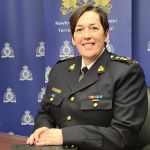 Assistant Commissioner Jennifer Ebert,
Assistant Commissioner Jennifer Ebert, 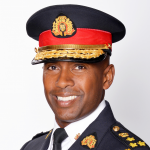 Chief Nishan Duraiappah,
Chief Nishan Duraiappah, 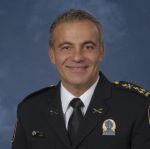 Chief Fady Dagher,
Chief Fady Dagher, 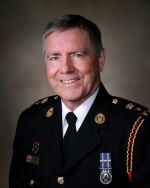 Director Paul Hebert,
Director Paul Hebert,  Chief Learning Officer Rob O'Reilly,
Chief Learning Officer Rob O'Reilly,  Chief Transformation Officer Colin Stairs,
Chief Transformation Officer Colin Stairs,  Deputy Chief Roger Wilkie,
Deputy Chief Roger Wilkie, 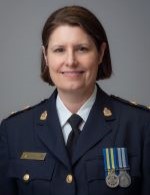 Superintendent Shelley Horne,
Superintendent Shelley Horne, 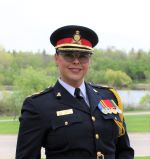 Deputy Chief Farica Prince,
Deputy Chief Farica Prince,